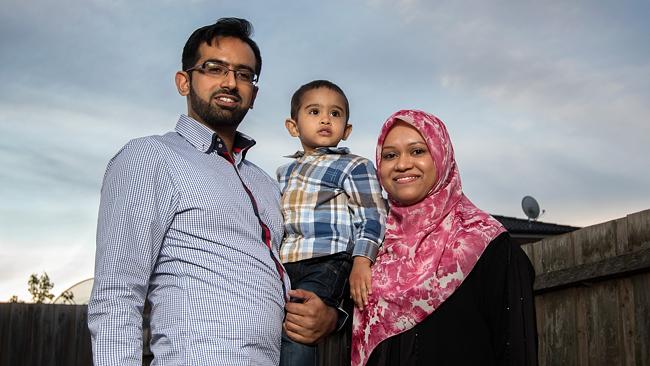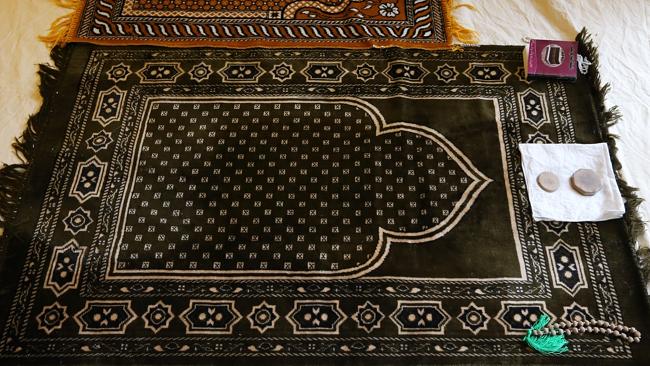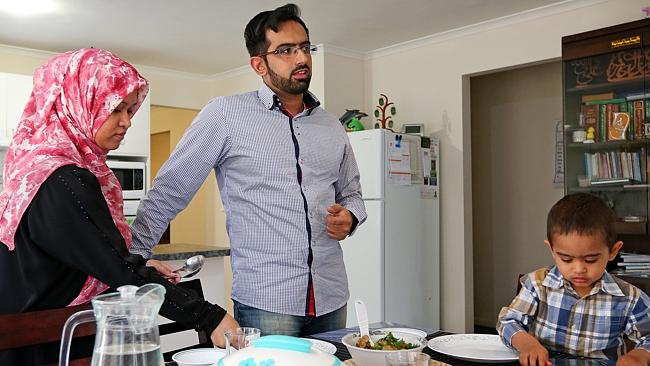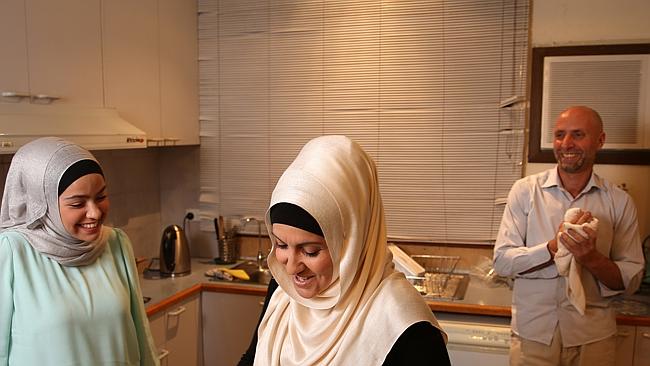



RNA - Fatima and Hussain’s home is tucked away in a quiet street in Melbourne western suburbs.
At the entrance to the modest property there is a shoe rack, where the family and visitors remove their shoes to follow the Muslim practice of keeping the house clean.
Mohammad, 3, runs up to say hello and then runs back to his father’s side, shyness quickly overtaking his initial exuberance.
“Welcome,” Hussain says.
His wife Fatima, whose black hijab is topped with a pink and white scarf framing her face, greets us with a warm smile.
The couple do not want their real names used, but they still want other Victorians to understand why they follow Shia Islam, one of the two major denominations of the religion. The other is Sunni.
“We all follow the same calender, the same practice, there are only a few opinions in history that are different,” says Hussain, an IT worker.
Their day starts before sunrise with a prayer in their specially designated room. It is the first of five obligatory daily prayers.
“You are taught from early childhood how to pray and there are rulings on prayers, where to pray, how you can pray, and the need to be clean,” Hussain explains.
“Shi’ites pray on either a sand tablet, or wood or stone, anything made out of nature or stone.
“Other sects also pray on mats or carpet. But it is the same prayer.”
The couple, both 29, came to Australia from India in 2008 because of its religious tolerance, strong economy and to allow Fatima to complete a masters degree in professional accounting.
Mohammed, who flits between riding a trike and drawing as his father talks, was born at Sunshine Hospital and his parents became Australian citizens two years ago.
Like most preschoolers, Mohammed is a fan of The Wiggles and Busy Beavers.
He is delighted when his father plays a video on his smartphone of The Wheels on the Bus go Round and Round.
When he is older he will attend a Sunday school that combines cultural and religious teachings.
Fatima works three days a week at one of major banks and on these days the couple leaves home together about 7.30am and Mohammed is dropped off at daycare.
She wears the hijab whenever she leaves the house or if male visitors come to her house.
“For me, it’s a part of me, it is a symbol of modesty, and it also brings me closer to Allah. I think I am more confident, more secure when I wear hijab,” she says.
Hussain says he and his wife both grew up with strong family values and apart from religious gatherings, they spend most of their time at home.
“We do go out with other families. I have friends who are Hindus or Christians, atheists,
I have never had issues,” Hussain says.
“The only thing is, it’s a tradition, it’s a culture and it’s a religion, that doesn’t allow much interaction between the men and women, so we try and limit it to women meeting women and men meeting men.”
Their second prayer of the day is around lunchtime.
“I have enough good bosses; they allow me an extra 15 minutes of my break to go and pray.
I don’t smoke, I don’t go out for other free breaks, it is part of the deal,” Hussain says.
He says prayer is a form of submitting to God.
“When you go and bow down to him then you say, ‘OK, apart from all that I have achieved, what I have and all that I will have, the family, the kids, the money, the house, I stand here right in front of you, feeble and weak, asking for forgiveness if I have sinned’.”
Hussain says he is left with a feeling that God is right inside him.
“You feel peace, you feel marvellous.”
The couple have a local cleric they speak to about day-to-day issues and they travel to the mosque in St Albans for important dates on the Islamic calender.
“We have a gathering every Thursday with friends and family and do a few religious reading to understand the religion better,” Hussain says.
Tonight they sit down a meal of curry and bread, but they are just as likely to eat lasagne or burritos.
“We eat everything, the only thing is the meat used it is halah and no pork,” he says.
“We don’t have a problem with other people eating it (pork), it’s that we can’t eat it,” he says.
“That is the same with alcohol. A Muslim is always on duty in front of God. If you have wine you are not in your senses. You lose your sense for a bit or two and you are not under the divine law of God.”
Hussain regularly cooks and assists with the housework, though Fatima finds her days off work filled with cooking, cleaning and washing.
Before eating, they say a prayer that always begins with: “In the name of Allah, the compassionate, the merciful.”
“These are the words of the Holy Koran, 113 of the 114 chapters start with this verse,’ Hussain says.
“It really surprises me what people nowadays say on the name of Islam or on the name of religion are killing each other.
“I don’t know what kind of book they are following, but the Lord I follow has said, read this, that in the name of the Lord that is most compassionate and merciful.”
After dinner, they play with Mohammad, who loves kicking the ball and swinging a small bat as though he is playing cricket. He goes to sleep with rhymes and a bottle of milk.
Hussain and Fatima watch a little TV, usually the news and documentaries and programs such as The Block and Masterchef.
“We try to go to bed early because you have to get up early for prayers again in the morning.”
SAARA Sabbagh, 42, and Ramzi Elsayed, 48, have a stunning view of Kinglake National Park from their loungeroom window.
The room, decorated with artwork depicting Middle Eastern architecture and Arabic script, also doubles as the place of prayer for the married couple and their daughter Saajeda.
Like all followers of Islam, they wake before sunrise for the first prayer of the day.
It’s a time for the family to come together before the pace picks up for work and school.
“We’ll begin with our morning prayer and then throughout the day as we go along, whether I’m at work, my husband’s at work and Saaj’s at school, we fit our daily schedule around the prayer times,” Ms Sabbagh says.
“We look at it like a meditation. It is like when you take time out for either a coffee break or a tea break. For me, it’s a meditation break,” Ms Sabbagh says.
Year 11 student Saajeda, who is a keen netballer and netball coach, says she plans her days accordingly.
“If I know I’m going to go shopping and my afternoon prayer will start at 1pm, I’ll probably leave at 1.10pm. There’s no point in leaving at 12.30pm and praying at the shops and putting myself in an uncomfortable situation.”
“At school and at netball it’s a bit difficult, but you get around it.”
The household is quieter since their two older children married, but both still live nearby. They bucked the general Australian trend of leaving marriage until their late 20s, early 30s.
“The reason people choose to marry young in the Islamic tradition is those who are practicising the faith will adhere to the idea that there is no relationship outside of a marriage,” Ms Sabbagh says.
A former accountant Mr Elsayed now runs a wholesale business selling carpets and mats.
His parents were Lebanese Muslims who come separately to Australia in the 1950s and met and married here. He was born in Colac and his family moved tnorth-easterns northeastern suburbs in the late 1960s.
The former president of the Islamic Council of Victoria has worked tirelessly in the community to help build bridges between Muslims and non-Muslims and feels some of that work is being undone by the alarm over terrorism.
“That temperature is rising in the community and people are feeling unsafe, that is the sad part. The goodwill is being eroded, because one of the things we have to have as a community is safety.”
Sabbagh says it has made her more protective of Saajeda.
“How that affects our family is, for example, when she’s training at netball, I won’t let her travel on her own to the courts anymore, or use public transport,” she says. “So we’ve had to make adjustments to our life.”
However, they believe goodwill is prevailing.
Ms Sabbagh, who migrated to Australia at the age of 6 with her Syrian family from Lebanon, works part-time at Benevolence Australia.
“It has a focus on spiritualism, derived from the Islamic ethos, and health and wellbeing,” she says.
She also visits schools to talk and run workshops about understanding Islam and what it means to be a Muslim in today’s world.
“Often it’s the same questions: Why do you wear a headscarf? Do you get hot in that? The whole terrorism questions,” she says.
She enjoys debunking the stereotypes and talking about what Islam means to her.
“I’m not Muslim because I have to wear a headscarf — that’s not pleasant sometimes — I’m not a Muslim because I have to fast or pay charity. I’m Muslim because there is a purpose in my creation and I connect to a higher source,” she says.
“And there is a spiritual dimension, the disciplining of the inner self, the character, character-building, that is why I am Muslim.”
Saajeda stopped playing netball for a few years when she started wearing her scarf becselfconsciousself-conscious.
“I think in year 9 I started again. I’m really inclined to doing sport, I’m not into going to the gym or working out, that bores me. But I’m into playing sport and being competitive. I missed it,” she says.
However, there were a few hurdles at the start.
“When I first started playing in games, they would always say ‘No, you are not allowed to play’ or ‘You can keep your scarf on, but you have to take your pants off.’ I’d go, ‘No, that’s not going to happen’,” Saajeda says.
Mr Elsayed says a lot of work has been done over the years to educate sporting groups about the need for Muslim girls and women to remain covered during play.
Saajeda, who is studying English language, psychology, legal studies and sociology at the Centre of Adult Education, has grown up without TV — not for religious reasons, her parents think it’s too mind-numbing — and is disinterested in social media.
“I used to have Facebook. I’m currently on and off with it. Social media used to be a big thing, but now it has died down for me personally. Instagram I use, on my phone, but that’s about it,” she says. “It was tiring to keep up with everything.”
She says the structure of Islam has helped her through her teenage years.
“I think all teenagers have that lost period, ‘Who am I?’ I think all Muslims have that too, ‘Do I want to be Muslim?’ Once you go through that period of, ‘Yeah, I do, I love this and I enjoy this’, you come out of it stronger.
“I have heaps of family who used to wear the scarf and then take it off, you go through that, it’s all about what you feel on the inside.
“You get your low times and you get your high times, I know my boundaries.
“I like the structure and doing the right things because of my faith.”
R111/108/B/